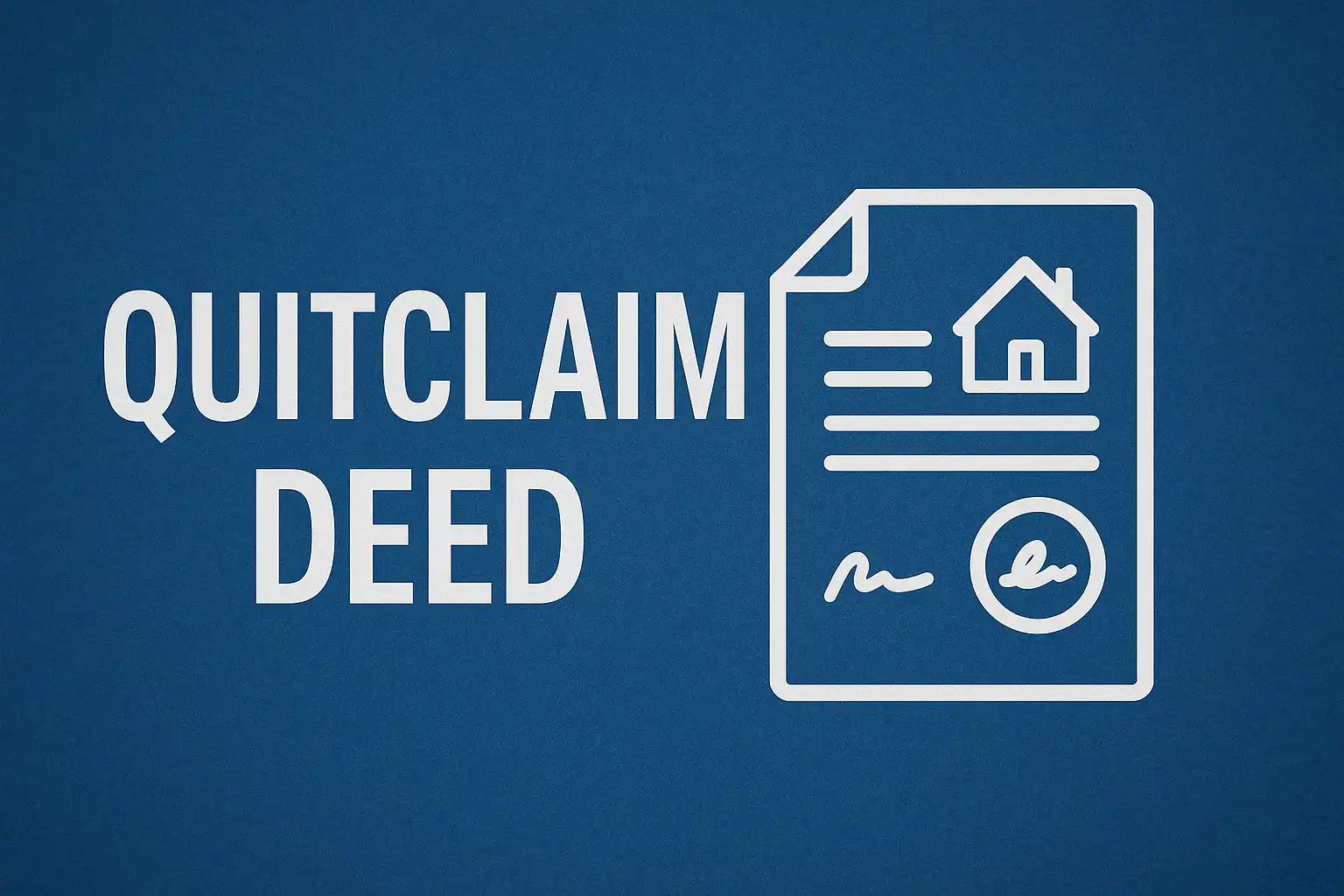
A quitclaim deed is a legal document used to transfer real estate ownership from one party (the grantor) to another (the grantee) without any guarantees about the property’s title. Unlike other types of property deeds, quitclaim deeds offer no warranties or protections—the grantor simply transfers whatever interest they may have in the property, if any.
Understanding quitclaim deeds is crucial for anyone considering property transfers between family members, during divorce proceedings, or when clearing title issues. This comprehensive guide covers everything you need to know about quitclaim deeds, their uses, limitations, and alternatives.
How Quitclaim Deeds Work
When someone signs a quitclaim deed, they’re essentially saying, “I’m giving you whatever rights I have to this property, but I’m not promising that I actually own it or that there aren’t any problems with the title.”
The quitclaim deed transfers only the grantor’s interest in the property. If the grantor owns 100% of the property, the grantee receives 100%. If the grantor owns nothing, the grantee receives nothing. If there are liens, encumbrances, or other title issues, those problems transfer with the property.
Key Components of a Quitclaim Deed
Every valid quitclaim deed must include:
- Grantor information (person transferring the property)
- Grantee information (person receiving the property)
- Property description (legal description from public records)
- Consideration statement (usually nominal, like $1)
- Grantor’s signature (notarized in most states)
- Proper witnessing (requirements vary by state)
When to Use a Quitclaim Deed
Quitclaim deeds work best in situations where the parties know and trust each other, and title issues are unlikely. Common scenarios include:
Family Transfers
Adding a spouse to title: After marriage, many couples use quitclaim deeds to add the new spouse to the property title. This creates joint ownership and may provide inheritance benefits.
Divorce proceedings: When couples divorce, one spouse often quitclaims their interest to the other. This removes their name from the title but doesn’t affect mortgage responsibility.
Inheritance planning: Parents may quitclaim property to adult children as part of estate planning, though this has significant tax implications that require professional consultation.
Title Corrections
Fixing name errors: If someone’s name is misspelled on a deed or they’ve changed their name, a quitclaim deed can correct the public record.
Clearing minor title issues: Small title problems, like missing signatures from previous transfers, can sometimes be resolved with quitclaim deeds from the appropriate parties.
Trust Transfers
Moving property into trusts: Property owners often use quitclaim deeds to transfer real estate into revocable living trusts for estate planning purposes.
Trust distributions: When trusts distribute property to beneficiaries, quitclaim deeds typically handle the transfer.
When NOT to Use a Quitclaim Deed
Quitclaim deeds are inappropriate and potentially dangerous in several situations:
Traditional Sales
Never use quitclaim deeds for arm’s-length real estate sales between strangers. Buyers in these transactions need the protections that warranty deeds provide, including:
- Title warranties and guarantees
- Protection against unknown liens
- Recourse if title problems emerge
- Title insurance coverage
Unknown Title History
If you’re unsure about the property’s title history or potential problems, don’t accept a quitclaim deed. The lack of warranties means you have no legal recourse if issues arise.
High-Value Transactions
The more valuable the property, the more important title protections become. Quitclaim deeds offer no financial protection if problems emerge after the transfer.
Investment Properties
When purchasing investment real estate, always insist on warranty deeds and title insurance. The financial risks are too high to accept a quitclaim deed’s limitations.
Important Limitations of Quitclaim Deeds
Understanding what quitclaim deeds don’t do is crucial for making informed decisions:
No Title Warranties
The grantor makes no promises about:
- Whether they actually own the property
- Whether the title is clear of liens or encumbrances
- Whether there are any title defects
- Whether they have the legal right to transfer the property
Mortgage Complications
Quitclaim deeds don’t affect existing mortgages. Key considerations include:
Mortgage liability continues: The original borrower remains responsible for loan payments even after quitclaiming the property away.
Due-on-sale clauses: Many mortgages include clauses that allow lenders to demand full payment if ownership transfers. While rarely enforced for family transfers, this risk exists.
Refinancing difficulties: The new owner may need to qualify for a new mortgage or assume the existing loan through proper channels.
Tax Implications
Property transfers via quitclaim deed can trigger various tax consequences:
Gift taxes: Transfers for less than fair market value may be considered gifts, potentially triggering federal gift tax obligations.
Capital gains issues: The way ownership transfers affects the property’s tax basis, potentially creating larger capital gains taxes upon future sale.
Property tax reassessment: Some states reassess property taxes when ownership changes, potentially increasing annual tax bills.
Quitclaim Deed vs. Other Deed Types
Understanding the differences between deed types helps you choose the right option:
Quitclaim Deed vs. Warranty Deed
Warranty deeds provide maximum protection:
- Grantor guarantees clear title
- Protection against all title defects
- Legal recourse if problems arise
- Required for most traditional sales
- Compatible with title insurance
Quitclaim deeds offer no protections:
- No guarantees about title quality
- No recourse for title problems
- Suitable only for trusted party transfers
- Limited title insurance options
Quitclaim Deed vs. Grant Deed
Grant deeds (common in California and some western states) provide middle-ground protection:
- Grantor guarantees they haven’t transferred the property to someone else
- Protection against grantor-created title problems
- More protection than quitclaim, less than warranty
- Often used in standard California real estate transactions
State-Specific Requirements
Quitclaim deed requirements vary significantly by state. Critical variations include:
Recording Requirements
Filing locations: Some states record at the county level, others at different jurisdictions
Recording fees: Range from $10 to over $100 depending on location
Documentary stamps: Some states require tax stamps based on property value
Execution Requirements
Notarization: Most states require notarized grantor signatures
Witnesses: Some states require one or more witnesses
Spouse signatures: Many states require spouse signatures even if they’re not on the title
Format Requirements
Form content: States have specific requirements for deed language and format
Legal descriptions: Property descriptions must meet state standards
Margins and paper: Some states have specific physical format requirements
Common Mistakes to Avoid
Several errors can invalidate quitclaim deeds or create serious problems:
Inadequate Property Description
Using incorrect or incomplete legal descriptions can make the deed ineffective. Always use the exact legal description from public records, not just the street address.
Missing Required Elements
Each state has specific requirements for valid deeds. Missing notarization, witnesses, or required language can invalidate the transfer.
Ignoring Mortgage Implications
Failing to consider existing mortgages can create serious financial and legal problems. Always consult with lenders before transferring mortgaged property.
Tax Planning Oversights
Property transfers have complex tax implications. Consult with tax professionals before proceeding, especially for high-value properties or gift situations.
Recording Delays
Failing to record the deed promptly can create title problems. Record quitclaim deeds as soon as possible after execution.
Professional Guidance Recommendations
While quitclaim deeds are relatively simple documents, professional consultation is often wise:
When to Consult an Attorney
- Complex family situations (divorce, inheritance disputes)
- High-value property transfers
- Properties with known title issues
- Business entity transfers
- Any situation involving uncertainty about legal implications
When to Consult Tax Professionals
- Transfers between non-spouses
- High-value property gifts
- Investment property transfers
- Situations involving potential capital gains
- Estate planning considerations
When to Use Title Companies
- Any transfer involving strangers or arm’s-length transactions
- Properties with complex title histories
- High-value transfers requiring title insurance
- Situations requiring professional title searches
Alternatives to Consider
Depending on your situation, other options might be more appropriate:
Warranty Deeds
For traditional sales or when maximum protection is needed, warranty deeds provide comprehensive guarantees and protections.
Life Estate Deeds
For estate planning purposes, life estate deeds allow property owners to transfer future ownership while retaining lifetime use rights.
Trust Transfers
In some situations, transferring property to revocable trusts provides more flexibility and protection than direct quitclaim transfers.
Joint Tenancy Arrangements
For married couples, creating joint tenancy with rights of survivorship might be more appropriate than quitclaim transfers.
Conclusion
Quitclaim deeds serve important purposes in specific situations, particularly for transfers between trusted parties and title corrections. However, their lack of warranties and protections makes them inappropriate for many property transfers.
Before using a quitclaim deed, carefully consider your specific situation, understand the limitations and risks, and consult with appropriate professionals when needed. The relative simplicity of quitclaim deeds shouldn’t overshadow their serious legal and financial implications.
Remember that property transfers are permanent legal actions with lasting consequences. Taking time to understand your options and seek professional guidance when appropriate can prevent costly mistakes and protect your interests.
For professionally prepared quitclaim deeds and expert guidance tailored to your state’s requirements, consider consulting with qualified legal or real estate professionals who can ensure your property transfer is completed correctly and legally.
Sources:


Leave a Reply